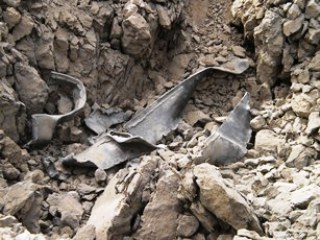S. Sudanese activists demand probe into existence of cluster bombs
February 13, 2014 (JUBA) – A coalition of human and civil rights advocacy groups in South Sudan have called for the formation of an independent technical committee to urgently investigate the alleged existence of cluster bombs in the country.

“Political differences should not be resolved through violence but within the limit of laws and international norms and standards,” it added.
Violence broke out in the South Sudanese capital in mid-December last year following a dispute between the presidential guards, but later spread to three of the country’s 10 states killing thousands and displacing nearly a million.
“The use of violence as a mean to claim any right or as a ploy to remain in power should not be encouraged. We therefore call on the people of South Sudan to reject leaders with such views,” noted the group’s statement, which demanded formation of a committee to investigate existence of cluster bombs.
South Sudan, according to the activists, has no capacity to manufacture bombs; an indication that what was being used in the ongoing conflict originated from outside the country.
“It is unfortunate that the conflict appears to have involved the use of dangerous weapons which have been banned worldwide, because of their known adverse effects not only to the warring parties but innocent civil population,” further says the groups’ strongly-worded statement.
For this reason, we call on the government to immediately an independent technical committee to investigate how such a weapon came to the country and take necessary measures, including the banning the use and hold those responsible accountable, it added.
The chairperson of South Sudan’s demining commission, however, said the bombs may have been a remnant of the more than two decade conflict with Sudan, which led to its cessation from the latter in July 2011.
“I heard of the discovery, but in the area which the current conflict, which the result of the December failed coup attempt has never reached. I don’t have full details because we are still conducting more research but I am told that it was found in an area not far from Juba,” said Jurkuc Barac.
“What I know for sure is that this could a remnant of war with Sudan. It has nothing to do with recent conflict,” he added, vowing further investigations in to the incident.
Cluster bombs or cluster munitions are defined as large weapons which are deployed from the air by aircraft, including fighters, bombers and helicopters. The bombs, officials say, may fail to detonate on impact and become de facto landmines, killing and maiming people long after a particular conflict has ended.
“The unexploded ones are more lethal than antipersonnel mines,” said an official from the demining commission, who preferred anonymity.
REBELS DENY USING CLUSTER BOMBS
A spokesperson for the Sudan Peoples Liberation Movement/Army (SPLM/A) In Opposition has, meanwhile, categorically denied their forces were use of cluster bombs in South Sudan’s Jonglei state capital, Bor or any part of the country.
“Our Forces do not have cluster bombs. [The] SPLA and UPDF [Uganda Peoples Defense Forces] used banned cluster bombs against our forces and therefore should be accountable by concerned bodies and institution,” said Brig. Gen. Lul Ruai Koang.
(ST).
